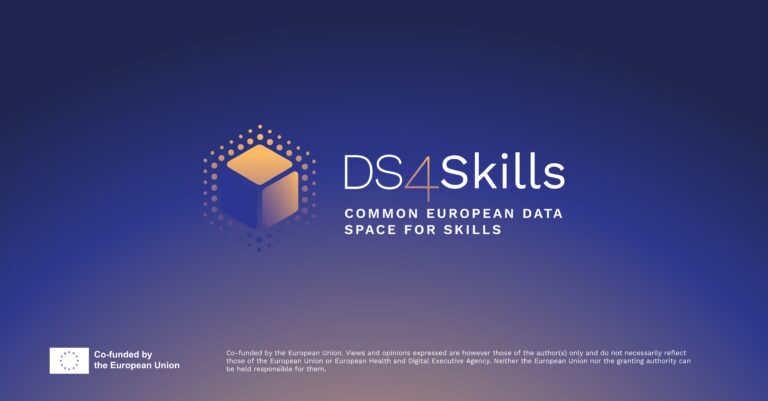DS4Skills – the Human-Centric Space for Skills & Growth

Co-funded by the European Commission, the DS4Skills project started in January 2025 and marks the continuation of the work to deploy the “first time ever” European Data Space for Skills that will offer practical benefits to organisations and individuals in the digital age.
Leveraging previous work from DS4Skills and EDGE-Skills projects, the new DS4Skills takes the next step by deploying a European Skills Data Space. To do so, it adopts a “use cases first” approach through eight large, sustainable use cases, that tackle key challenges such as lifelong learning, employee retention, research on learning paths, upskilling, and reskilling. These use cases are strategically designed to meet real-world workforce needs, demonstrating the value of the Skills Data Space in driving the digital transformation. By uniting various stakeholders, use case orchestrators will purchase data space services to launch and manage their initiatives, fostering innovation and collaboration while ensuring that the solutions remain relevant and impactful.
Use Cases for Real-World Impact
DS4Skills aims to transform opportunities and deliver benefits to a wide range of stakeholders through the following use cases:
- Supporting Student Mobility & Lifelong Learning
Improves discovery of learning opportunities across European university alliances, reducing manual data handling and boosting data quality through AI. This helps create a more connected and efficient European education area where students can easily navigate their learning journeys.
- Human Soft Skills Assessing Automation
Develops a tool for managers and employees to assess and develop soft skills, fostering critical thinking and innovation in organisational challenges. It supports continuous personal development by aligning soft skills assessment with real workplace needs.
- Mind the Gap: Skill-driven Strategic Workforce Learning and Development
Enables targeted, personalised upskilling and development programs, improving career development through data-driven insights. This use case promotes resilience and adaptability in the workforce through more intelligent training design.
- Mind the Gap: Personalised and Job Market-Aligned Training for Future-Ready Workforce
Delivers custom learning pathways based on market demands, bridging skill gaps and enhancing career opportunities for lifelong learners. It empowers individuals with in-demand skills, directly improving employability and workforce readiness.
- Connecting Personal skills-data to the Data Space
Enables secure data sharing between personal skills ecosystems and the EU Skills Data Space, enhancing job search and recruitment across Europe. This interoperability boosts the value of individual skills profiles across borders and sectors.
- Students’ Learning Experiences and Skills Dataspace
Develops a framework to share and analyse student experiences and skills, helping improve training effectiveness and educational satisfaction. It also enables institutions to better tailor curricula based on real student outcomes and feedback.
- Dataspace for Manufacturing Skills
Bridges the gap between theoretical and practical skills in advanced manufacturing, creating personalised learning paths for students and workers. It contributes to closing skills shortages in key industrial sectors by aligning education with industry needs.
Who Benefits from DS4Skills?
At its core, DS4Skills creates a common European Data Space for Skills – a secure, trusted, and interoperable ecosystem that directly connects key stakeholders across Europe. This enables smarter upskilling, more targeted employment matching, and real-world value for a wide range of users.
In a rapidly evolving digital landscape, DS4Skills directly empowers:
- Education and training providers
Access to high-quality, interoperable skills data enables educators to better align learning offers with market demands, personalise training pathways, and fine-tune curricula to evolving digital skillsets. - ICT related services
Interconnecting with relevant skills data becomes easier, supporting the development of innovative services and accelerating innovation and digitisation across the sector. - Research centers and networks Researchers benefit from access to large-scale, high-quality education and employment data, which supports future skills planning and fosters innovation in workforce development.
- Employment services and job intermediaries Bridging the gap between skills supply and demand allows for more efficient candidate matching, improved career guidance, and enhanced support for cross-border recruitment mobility.
- Industrial stakeholders and SMEs
Faster recruitment and better alignment between training and workforce needs are supported, while a shared data infrastructure fosters innovation and competitiveness. - Public authorities and policymakers in the education and employment arena Evidence-based policymaking is strengthened through better planning, resource allocation, and improved recognition of qualifications across borders, all within a secure, GDPR-compliant framework aligned with the Data Governance Act.
- EU Citizens / Individuals
Tailored professional development and job matching are made possible, with a streamlined, engaging skills data ecosystem. Human control is prioritised, empowering individuals to define their own paths while the Data Space meets the needs of people and stakeholders alike.
By connecting these diverse stakeholders through a trusted and innovative data ecosystem, DS4Skills is shaping the future of digital skills development and employment across Europe.
🔵 Visit the project website: www.skillsdataspace.eu for the latest news and events.
🔵 Join our community on LinkedIn (@DS4Skills – Data Space for Skills) & YouTube (@skillsdataspace)